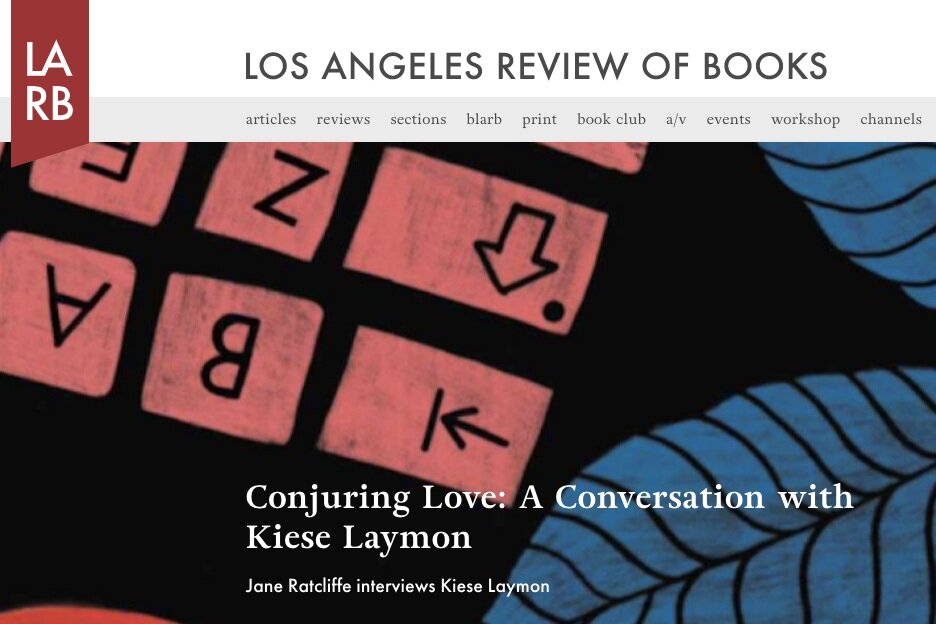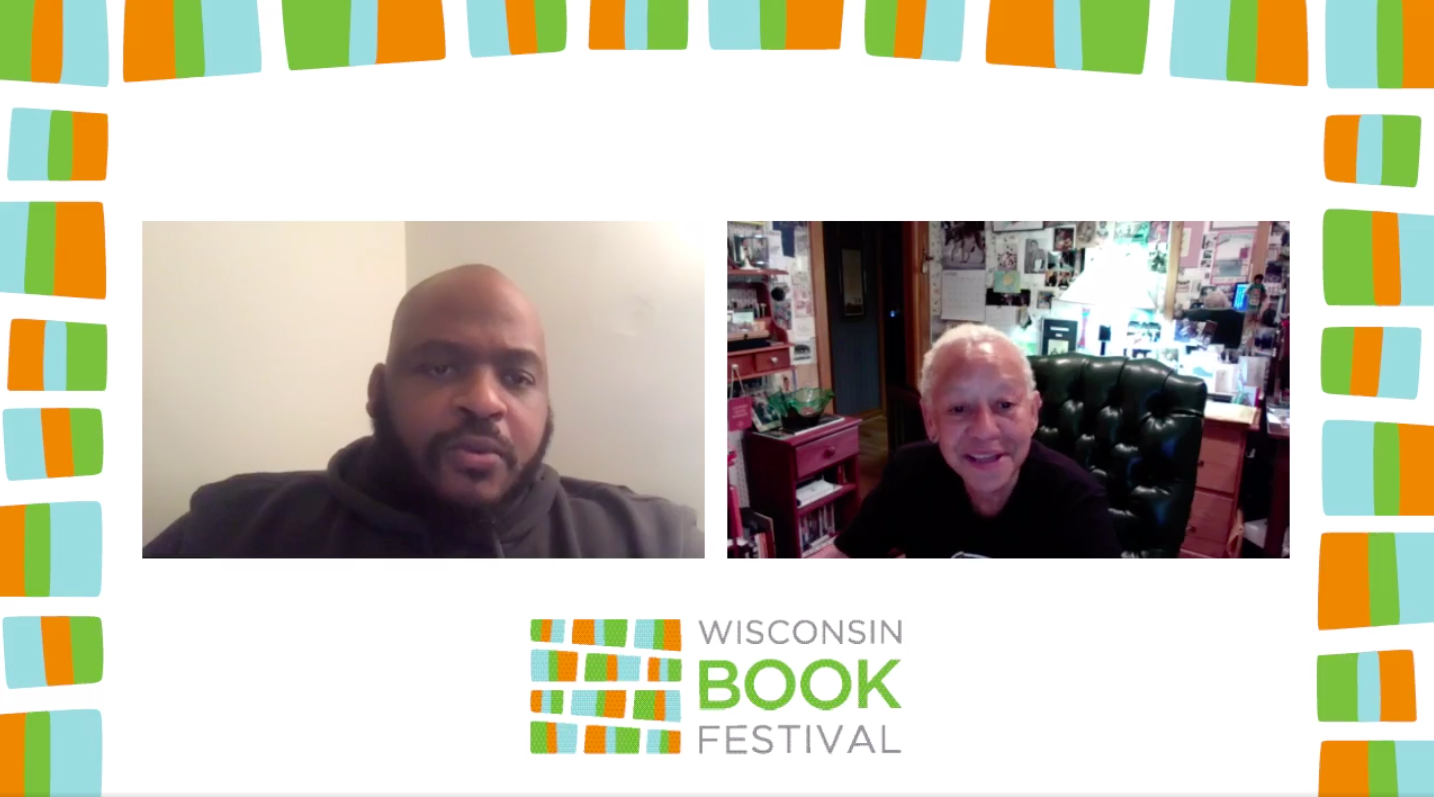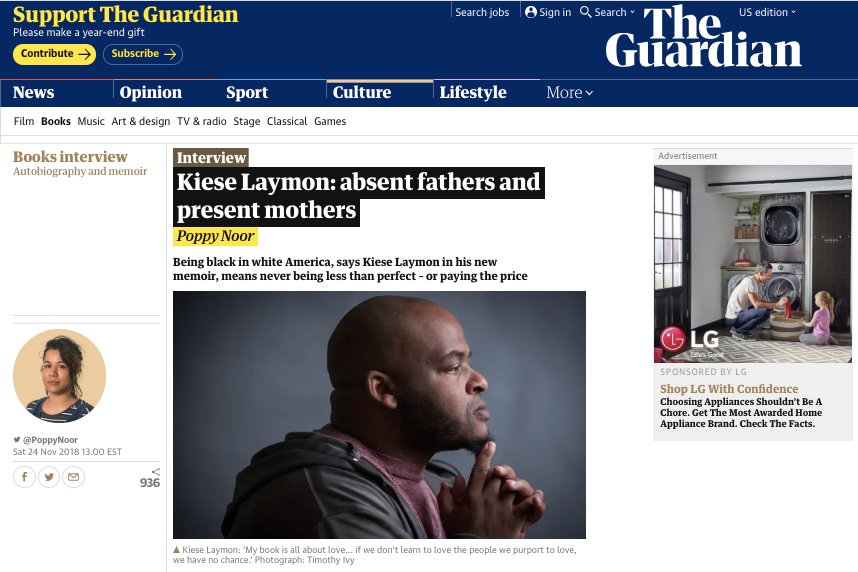THE SPIN
THE CONSENT CONVO WITH ESTHER ARMAH
October 27, 2016
SPECTOR
“ALL THINGS CONSIDERED”: CONVERSATION WITH KIESE LAYMON
December, 2013 · by Kameelah Janan Rasheed: No. 21: December, 2013
excerpt. . .
Rasheed
Long Division has this wonderfully detailed descriptions of City exploring his body, the bodies of his friends, and attempts to explore Baize’s body who seems wholly disinterested. Can you talk about the importance of the the Black body, gender, and sexuality in this text, but also in your growing body of work?
Laymon
Thanks so much for seeing how important body was to that text. I wanted to make a book about love and intimacy without wholly buying into silly designations of straight, bi or gay. I have never found myself sexually attracted to men, but I’ve definitely been in love with some men in my life. I didn’t want to fuck them and didn’t want them to fuck me, but I cared so much for them and they cared for me. And though we didn’t touch sexually, we really appreciated touch. We were always hugging each other, giving each other knowing looks on the court or when motherfuckers started acting crazy in public. This is love. But we don’t call it love enough. Men can have those kind of relationships without a reliance on dissing women. I think a lot of men and a lot of emcees add the dissing of women to their care for men because they’re afraid of being seen as queer. But that’s bullshit. If you don’t wanna fuck men, you don’t wanna fuck men. It doesn’t mean that you can’t fall in love with men. I don’t know why but I never wanted to kiss my best friend, Ray Gunn. I don’t know why but curvy bodies excite parts of me. I don’t know why. But I know that I’ve been in love with some men and some women and while I’ve had sex with some of the women I was in love with, I’ve also not had sexual contact at all with other women I’ve fallen in love with. You see what I’m saying. So yeah, dissing women doesn’t need to be a part of loving men. That’s so fucking wack to me. The characters in Long Division are definitely queer, but they’re also really in search of love and touch, like most of us. Think about how many times I describe hips or eyebrows or smells or hands. I wanted kids who read the book to know that it’s more than okay to talk about love and its relationship to the touch.
Rasheed
We can’t leave this interview without talking about Afrofuturism and Afrosurrelism. Have you read Black to the Future by Mark Dery? In it he says that more African-Americans should be writing science fiction because “African-Americans are, in a very real sense, the descendants of alien abductees. They inhabit a sci-fi nightmare in which unseen but no less impassable force fields of intolerance frustrate their movements; official histories undo what has been done to them; and technology, be it branding, forced sterilization, the Tuskegee experiment, or tasers, is too often brought to bear on black bodies.”
Laymon
I completely agree. We are the same. We are some Martians. We just are. And I love it. And I’d love to see folks create more with this in mind. I’m tired of the film and books that are wholly tied to “real” conceptions of history. That shit is boring. Everytime. Boring as hell, sentimental, and so not daring. I never get how we can be so daring in our music but so same song in our fiction and prose. It’s weird.
read full interview @
http://www.spectermagazine.com/twenty-one/laymon/
THE PARIS REVIEW
FUTURE TENSE: AN INTERVIEW WITH KIESE LAYMON
October 3, 2013 · by Whitney Mallet
excerpt. . .
And what also happens when people celebrate progress in that way, like it’s over, like it’s happened, is that no one thinks about the work to do for the future.
That’s what I’m trying to show in the book, the whole metaphor of work. That’s the thing about long division—the work is always shown. Going backwards, the work is there. In the present, the work is there. Going forward, the work has to be there. And we can’t ever think that we are delivered—not in this country. But a lot of people want to feel like we are delivered. And if people fail in this country, it’s their fault, because we have all been delivered to this postrace, multicultural society. If you fail, it’s all on you. But that’s bullshit. No, we haven’t all been delivered.
There’s still mad work to do, and, most worryingly, what I’m seeing is people doing a lot of work to make sure that some people don’t have healthy choices and second chances. That’s the bedrock of celebratory, productive, revolutionary citizenship—healthy choices and second chances, and progressive education. And we’re doing everything we can to not grant certain people healthy choices and not grant certain people second chances. So we’re losing, but we’re telling ourselves we’re winning, or we’re telling ourselves we’re better than other countries. I haven’t even been to other countries, so maybe we are. I just got a passport.
read full interview @
http://www.theparisreview.org/blog/2013/10/03/future-tense-an-interview-with-kiese-laymon/
THE NATION
A CONVERSATION WITH KIESE LAYMON
September 12, 2013 · by Roxane Gay
excerpt. . .
Is blackness a burden? If so, how do we carry it without breaking our backs?
Blackness, in and of itself, isn’t a burden at all. In this nation, we all carry the immense burden of being human, but our backs are sore as hell because white Americans have failed to compassionately reckon with the worst of white folks. They tried to destroy us intellectually, psychologically, emotionally, economically, and we helped them out quite a bit. When people with more access to healthy choices and second chances obsessively want, and really need, you to have even less access to healthy choices and second chances, your back and your heart will tend to break. The wonder is that we’re not broken. We’re not broken. The wonder is that we’re still here creating, still willing ourselves into generative kinds of human being even though we’re really, really, really, tired.
You wrote about how your mother raised you never to forget you were born on parole. How are young black children supposed to thrive under such conditions? Do you try to answer such an impossible question in your writing?
I think you thrive partially through milking your senses and your imagination, and placing yourself within a larger community of tough sensitive workers. My mother conflated survival with joy. She wanted me to be happy if I simply survived. I get it. I really get it. When a nation is implicitly and explicitly intent on destroying you and your son, survival feels like a win. But fuck that. As all-consuming and destructive as white supremacy is, it won’t win. When I read your stuff, for example, I see that white supremacy hasn’t won. I guess I’m dumb, but I believe in us and I believe that even though the game is rigged, we can actually win with love, tenacity, compassion, community and the will to fight and strategize when we have to. The alternative is death.
read full interview @
http://www.thenation.com/blog/176147/conversation-kiese-laymon#
CEASEFIRE PODCAST
ceasefire magazine march 2014
Ceasefire's Hana Riaz and Rukayah Sarumi talk to author Kiese Laymon about his novel 'Long Divison' and his use of language as a tool of resistance and affirmation. Find podcast @ http://ceasefiremagazine.co.uk/kiese-laymon-language-love-long-divsion/























